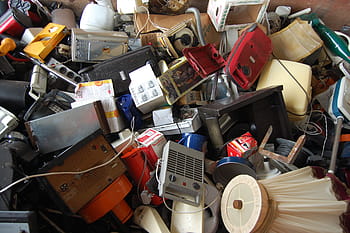The Lab Waste Management Program
Lab Waste Management | Assessments | Surplus Equipment | Surplus Chemicals | Efficient Appliances | Dry vs Oil Vacuum Pump



Many types of waste materials come out of laboratories. This set of pages is designed to help you understand what kinds of waste there are, the appropriate way to dispose of each one on the UCSB campus, and what happens to that waste after you dispose of it.
Waste Types:
Hazardous Waste: There are many materials that come out of laboratories that are unsafe or dangerous, and must be disposed of with care. Examples of this include radioactive materials, highly caustic or poisonous chemicals, biologically contaminated materials, sharps, etc. The procedures for handling these materials are established with each lab in concert with Environmental Health and Safety. Often these materials can only be disposed of through EH&S’s Hazardous Waste Pickup Program, or through an approved external vendor. For questions related to Hazardous Waste, including what is and is not categorized that way, please check with EH&S.
Chemicals: EH&S has very clear protocols on the appropriate disposal of chemicals. Many must be collected by their Hazardous Waste Pickup Program. Small quantities of a few chemicals are permitted to be placed in drains for disposal, but this should be done only after clearance from EH&S. Excess unused chemicals in their original bottles can also be sent to the Surplus Chemical Program run through EH&S. This is also a great place to acquire some chemicals at no cost, and source and quality of the chemical is logged on acceptance of the item.
Sharps/Broken Glass/ Autoclaved Materials: Some materials, such as autoclave-sterilized waste, sharps, and broken glass are safe enough to be sent to the landfill if they are not biologically or chemically contaminated. However, because these items pose a physical danger if handled, they must be placed in designated red-lidded rolling bins which are distributed to all laboratory buildings and picked up by a special truck on Saturdays. More information about this program can be found here. These bins must be kept locked when outside. The keys for these bins and all other dumpsters on campus are identical and any lab can have a copy. Getting a key is simple: find out how here.
E-Waste: Electronic waste is a growing stream, and it is crucial that we keep these items out of the landfill. Heavy metals in these materials are bad for the environment, and some are becoming increasingly scarce as natural deposits are mined and depleted, so recycling them properly is extremely important. Associated Students Recycling has a large number of E-Waste Drop-Off points all over campus. Larger electronic items must be sent to Distribution & Logistical Services (formerly Central Stores) for disposal. If the item is operational and someone else might want it, it can also be listed on the UCSB Surplus Sales site. You will need to store the item in your lab until another campus lab requests them.
Recyclable Lab Waste: Although most lab plastics cannot be recycled in Santa Barbara County, plastics #1 (PETE/PET - polyethylene terephthalate, or polyester) and #2 (HDPE - high-density polyethylene) can be thrown in the blue bins if they are non-hazardous and uncontaminated. These may include lab bottles, tissue culture media bottles, plastic storage containers (especially pipette tip boxes), and larger chemical storage containers.
Compostable Lab Waste: Some labs may generate materials which are compostable. We do not currently know of or operate any lab-related composting programs on campus, but are looking for labs to help us pilot such a program. Please contact us if you think your lab might be a good candidate for a lab composting program.
Landfill Waste: Some materials cannot be recycled effectively, and if they don’t fall into one of the above categories, the only place for them may be the landfill. UCSB laboratory buildings currently send about 40 tons of waste per week to the landfill. We urge labs to consider landfill bins the place of last resort for material disposal. If there is a material you generate a notable quantity of, we would like to help your lab find a way to recycle it, if possible. You can contact LabRATS for a Lab Waste Consultation.
